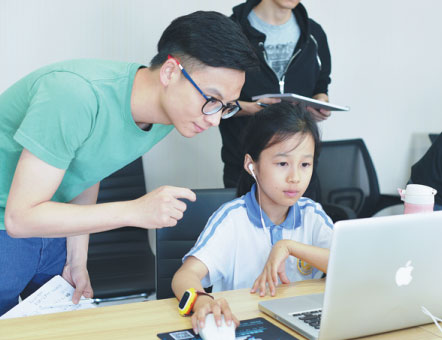Students showcase their skills in the global classroom


Li Tianchi and Sun Yue: Cracking the code to success
Li Tianchi and Sun Yue dream of creating a Hogwarts-like environment for China's young computer programers, aka coders.
In 2015, the entrepreneurs, then both in their mid-20s, founded Codemao, an online provider of programming tuition for children.
"We hope kids will realize that programming is like a magic key to unlock the future," Li said.
Li and Sun came up with the idea of starting a coding education business while pursuing master's degrees at the Technical University of Berlin, Paris-Sud University in France, and the European Institute of Innovation and Technology in Budapest, Hungary.
Sun, 29, went abroad after graduating from Beijing University of Posts and Telecommunications in 2012, while Li, 28, went overseas after graduating from Shandong University in 2013. They studied on the same program, which would allow them to obtain master's from all three European universities.
While attending an internet summit in Ireland, they were surprised by the programming skills of European children and realized how far behind China lagged behind. They decided to drop out and start their own business.
"The demand for coding education in China is growing rapidly as a result of technological developments such as artificial intelligence and the internet. The opportunity to start a business may have been lost if we had waited until we graduated," Li said.
"Bill Gates dropped out of school to found Microsoft, and we have also founded our own business."
The difficulty in promoting coding education is that there are only a small number of teachers who have experience of both programing and education.
"It's not only a problem in China, but worldwide, as outstanding computer professionals are sought by companies who pay high salaries. Schools can't offer equally high payment," Li said. "Meanwhile, the traditional programming codes and tools are difficult for students and primary school teachers to learn."
That problem provided an opportunity for Li and Sun. They are professionals in computers and programming, so they invited experts in education and cognitive psychology to help them create Codemao. The aim is to make coding as simple and interesting as building blocks for children.
Based on the computer tuition system at Stanford University in the United States, the teaching system is divided into nine levels.
It starts with teaching kindergarten or primary school students the basics of coding via game-playing experiences, with guidance from animated characters and graphic instruction options shaped like blocks. Then it gradually develops to include algorithms, data structure and programming languages.
"On our platform, kids learn to design graphic changes at the very beginning and then create simple games," Li said.
"When they finish all nine levels, they will be capable of building and managing big databases and developing large-scale websites. The world will need more new talent because computers or AI will replace humans to some extent. Therefore, people should learn coding to make computers or AI work for us, rather than letting them manipulate us."
What many people considered a reckless move has turned into a successful business. The company has won many startup and innovation awards and has more than 3.2 million users. It received investment of 300 million yuan ($43 million) in May, following on from 120 million yuan in November last year and 20 million yuan in 2016.
- 'Bauhinia Cup' ignites patriotism among Hong Kong students on PRC's 75th anniversary
- Over 50,000 in China's Hainan evacuated as Typhoon Trami grows
- Xi congratulates Chapo on election as Mozambique's president
- 5.5-magnitude quake hits China's Xinjiang: CENC
- 2024 China International Digital Economy Expo highlight digital industrialization achievements
- Deliberately dodging fact of Taiwan's return to China exposes Lai's nature of seeking 'independence': mainland spokesperson




































